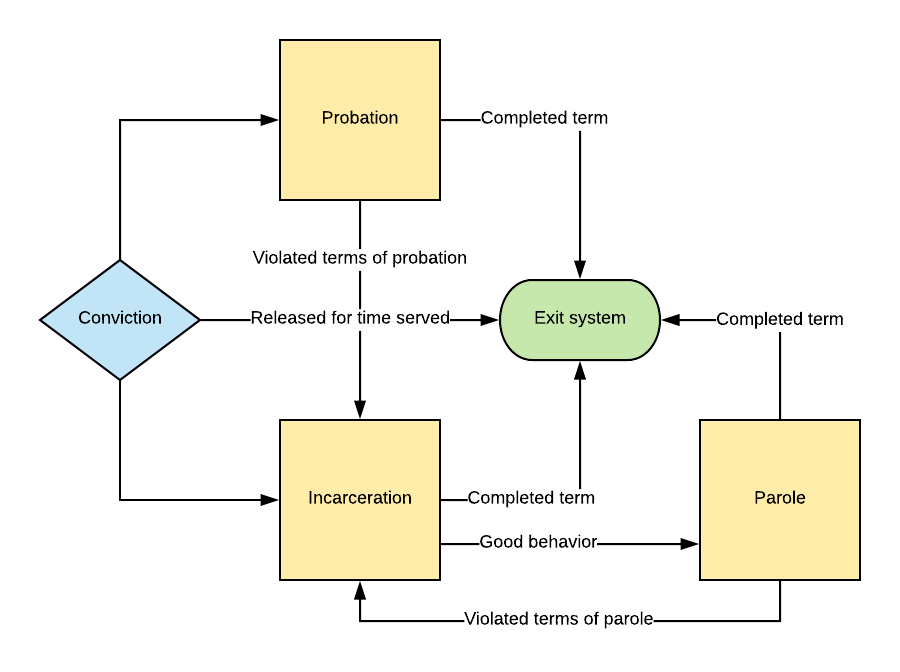Probation Population
The percentage of St. Louis adults who are serving probation
Black adults are four times as likely as white adults to be serving probation.
A score of 100 represents racial equity, meaning there are no racial disparities in outcomes. The lower the Equity Score, the greater the disparity.
For Probation Population, a score of 100 — a score reflecting racial equity — would mean black and white adults are equally likely to be serving probation. It is important to note that for this indicator, equity is not our only goal: we also want to improve outcomes for all.
More Information
What does this indicator measure?
Probation Population measures the percentage of St. Louis adults who are serving probation.
During a probation period, defendants must comply with conditions set by the court and avoid committing any other crimes. Common conditions are meeting regularly with a probation officer and/or passing drug tests. In 2016, there were 2,367 adults who were serving probation, which equates to just under 1% of the city’s adult population.
Probation Population analysis
Adults serving probation in St. Louis City.
| All | Black | White | Disparity Ratio | Equity Score | |
|---|---|---|---|---|---|
| Probationers | 2,367 | 1,866 | 480 | - | - |
| Adult Population | 241,488 | 106,307 | 114,343 | - | - |
| Percent of adult population serving probation | 1.0% | 1.8% | 0.4% | 4.181 to 1 | 26 |
Data Source: Missouri Department of Corrections, 2016; American Community Survey 1-year PUMS, 2016.
What does this analysis mean?
Black adult residents are more than four times as likely to be serving probation as white adult residents. In 2016, 1.8% of black adult residents are serving probation, compared to 0.4% of white adult residents. If representation in the probation population were equitable, there would be 1,429 fewer black residents serving probation.

Why does Probation Population matter?
The Urban Institute reports that "probation practice and outcomes affect the lives of more adults than any other criminal justice sanction." Probation is an alternative to incarceration and is common for first-time offenders and juveniles. Residents on probation need comprehensive support from their community in order to successfully complete the terms and conditions of probation. If residents violate the terms of their probation, their probation status can be revoked, which may result in incarceration.
Describing what progress looks like for this metric is not simple, as it is dependent on the alternatives available to the defendant and crime rates. If defendants sentenced to probation would have otherwise been sentenced to incarceration, then an increase in the probation population could be a sign we are moving toward a more equitable justice system. Additionally, if fewer misdemeanors and felonies overall were being committed, than a similar decrease in the probation population would also be a sign that we are moving toward a more effective justice system.
Which Calls to Action from the Ferguson Commission report are linked with this indicator?
The Ferguson Commission report’s calls to action related to probation include:
Questions for further investigation
- Why is there a racial disparity in Probation Population?
- What can St. Louis do to reduce racial disparities in Probation Population?
- What initiatives are currently underway to reduce racial disparities in Probation Population?
How can I learn more about this issue?
The Missouri Division of Probation and Parole supervises felony offenders ordered to probation by the courts. The Probation and Parole Division also manages the Transition Center of St. Louis, which provides comprehensive support to men released from the Division of Adult Institutions or under community supervision in need of additional services.
In 2014, the Urban Institute reported on racial and ethnic disparities in probation revocation, which is when probationers are found to be in violation of the terms of their probation and are incarcerated. They found black probationers were revoked at higher rates than white and Hispanic probationers at all sites that they studied.